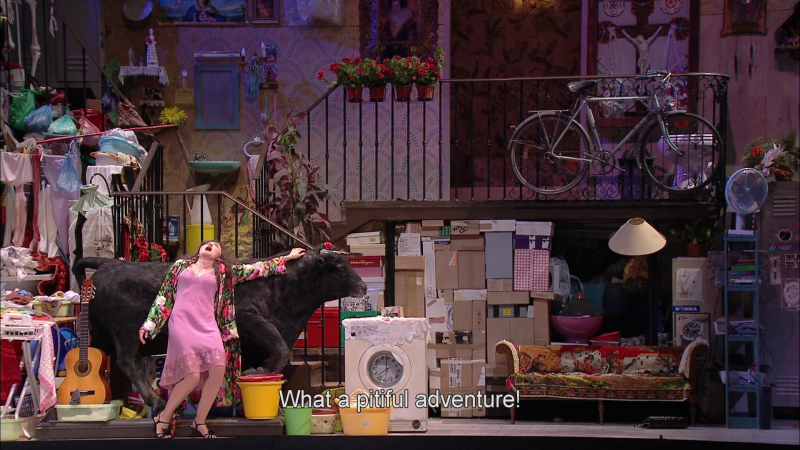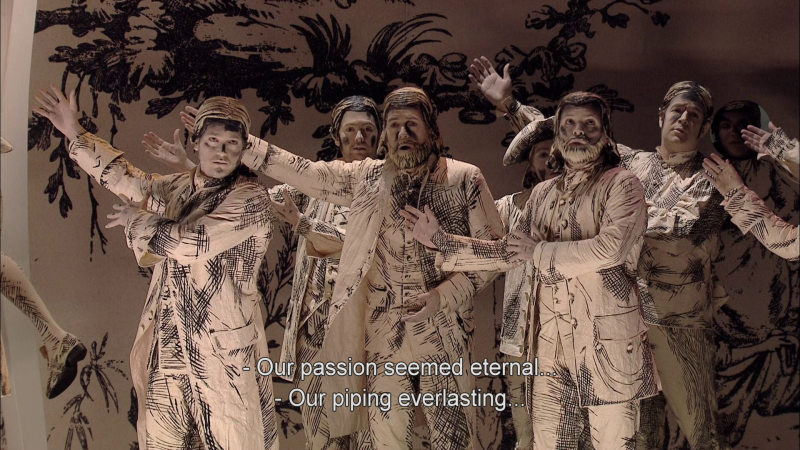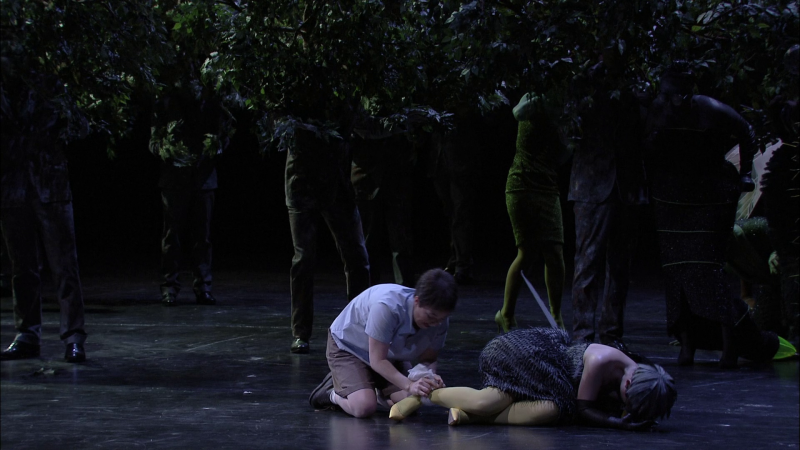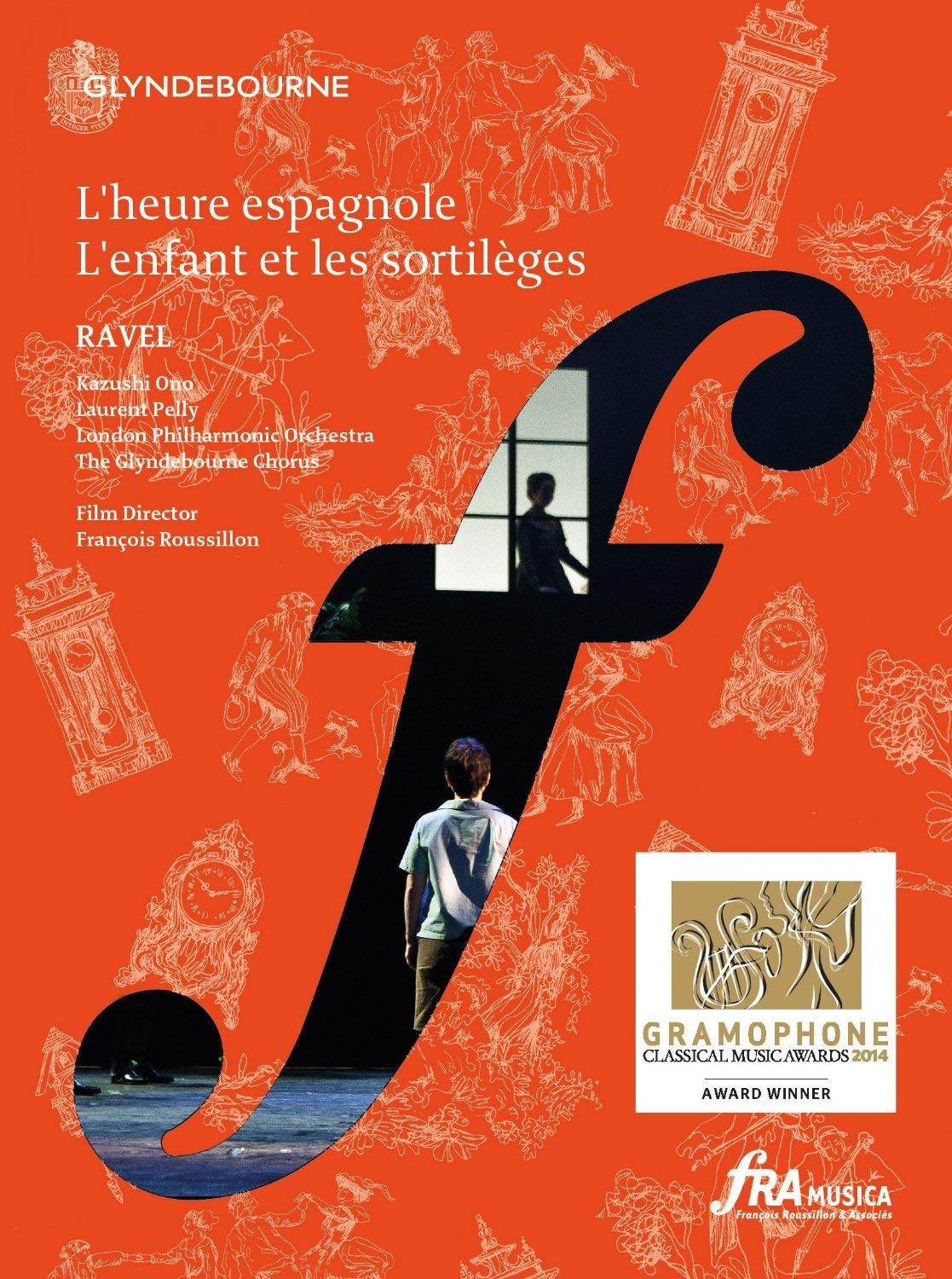
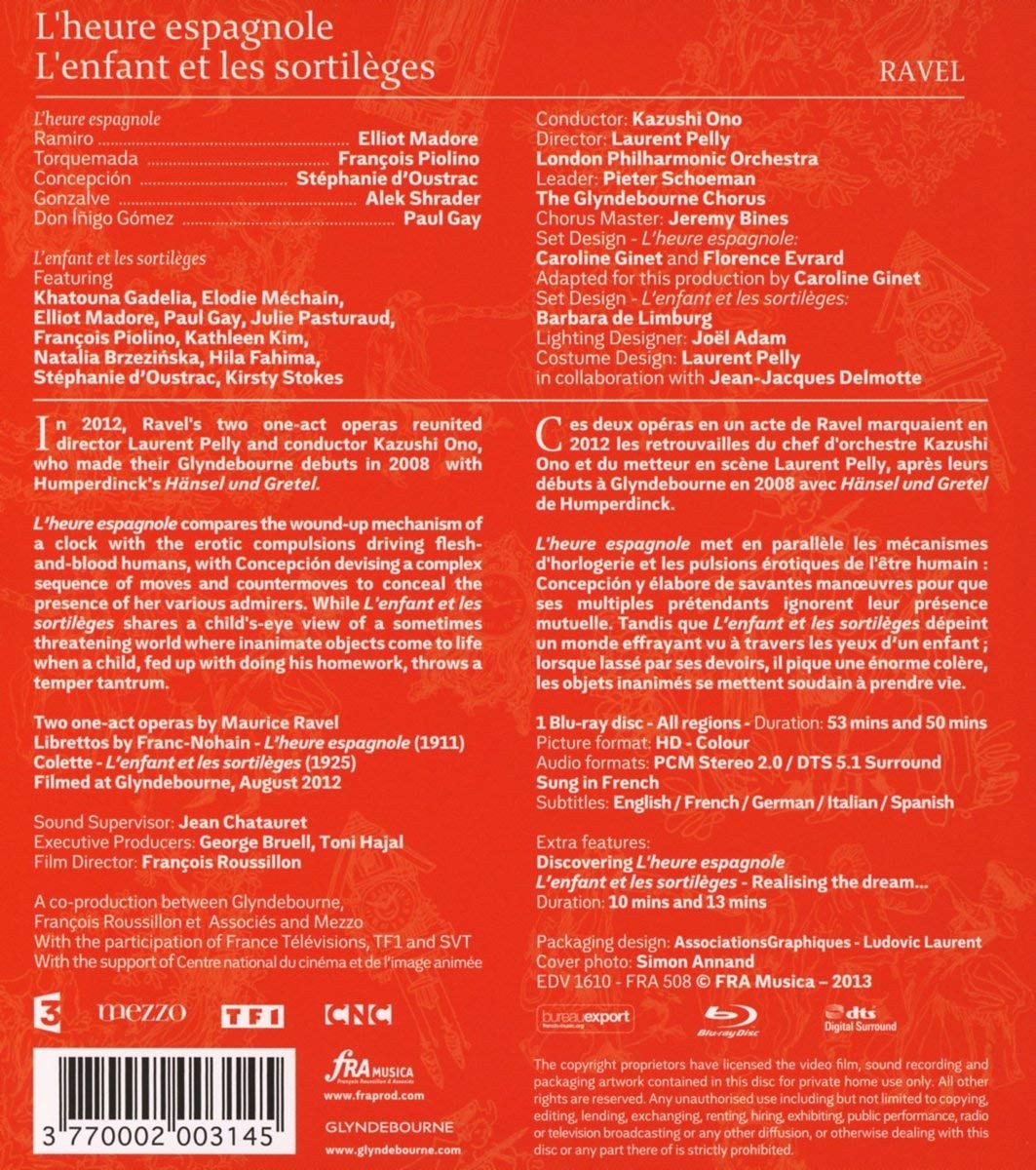
Ravel's two one-act operas are directed as a double feature by Laurent Pelly at Glyndebourne in 2012:
1. The disc begins with L'heure espagnole ("The Spanish Hour", or, better perhaps, "The Spanish Pastime" to a libretto by Franc-Nohain. The stars are Stéphanie d'Oustrac (Concepción ), Elliot Madore (Ramiro), François Piolino (Torquemada), Alek Shrader (Gonzalve), and Paul Gay (Don Iñigo Gómez).
2. Next comes L'enfant et les sortilèges ("The Child and the Spells", or better perhaps, "Spells of a Child") to a libretto by Colette. The stars are Khatouna Gadelia, Elodie Méchain, Elliot Madore, Paul Gay, Julie Pasturaud, François Piolino, Kathleen Kim, Natalia Brzezińska, Hila Fahima, Stéphanie d'Oustrac, and Kirsty Stokes. (Most of the stars sing several roles.)
Kazushi Ono conducts the London Philharmonic Orchestra (Leader Pieter Schoeman) and the Glyndebourne Chorus (Chorus Master Jeremy Bines). Set design for L'heure espagnole by Caroline Ginet and Florence Evrad, adapted for this production by Caroline Ginet; set design for L'enfant et les sortilèges by Barbara de Simburg; lighting by Joël Adam; costume design by Laurent Pelly and Jean-Jacques Delmotte. Directed for TV by François Roussillon; sound supervision by Jean Chatauret; music producer Sébastien Chonion; executive producers George Bruell and Toni Hajal. Sung in French. Released 2013, disc has 5.1 dts-HD Master Audio sound. Grade: A for L'heure and Grade: B for L'enfant
These are Ravel's only operas---both short, one-act jewels driven by exquisite orchestration. They are fairly well known, and there are many CDs of the music. But they are not that often performed because they call for a big investment in singers, scenery, and props for the length of the entertainment provided. I found one DVD with both L'huere and L'enfant, and I found another DVD with L'enfant paired with Peter and the Wolf. From what I could tell from the Internet (especially YouTube), this performance at Glyndebourne together with impeccable sound and pellucid video provided by François Roussilion "cleans the clock" of all previous recordings. Subject title is probably the only logical thing to buy for either of these operas.
L'heure espagnole.
This is an adult piece of situation and physical comedy about Conceptión, a desperate housewife. Conceptión is also something of a practical philosopher who has discovered 3 truths: (1) A good man is hard to find. (2) Much harder is it to find a good man who is also romantic. (3) And vastly, vastly harder is it to find a good, romantic man who can hold an erection longer than he can hold his breath.
Meet Señor Torquemada, Conceptión's husband (François Piolino). He's a clockmaker surrounded by hundreds of time pieces, but he's always a bit befuddled:
Conceptión (Stéphanie d'Oustrac) is dismayed. Her husband even forgets:
Conceptión reminds her husband to make his weekly appointment with his best client downtown. But others have not forgotten Torquemada's schedule. Ramiro, the mule driver (Elliot Madore), stays in the shop after Torquemada leaves:
Soon a student poet arrives (Gonzalve played by Alex Shrader):
And a rich banker (Don Iñigo Gómez played by Paul Gay) shows up as well:
So many men, so little time. Can Conchi find a way? At first things don't go so well:
Don't give up Conchi. . . try, try again. Eventually Torquemada returns. Nothing is more joyful:
Conchi winds up rather pleased with herself and her observation that of all the prospective lovers around:
In honor of Conchi's satisfaction, there is a grand finale before a cute ending:
I don't think I told too much. If you want to see how Conchi gets the job done, buy the disc. (Convenient purchase link below!) You'll be glad you did.
L'enfant et les sortilèges.
This whimsical tale would be appropriate for kids, but I think it's too abstract and dry to have much appeal to them. It's a fairy tale for adults. But even though it was written by the infamous Colette, there's not much eroticism in it (other than Stéphanie d'Oustrac's rendering of the sexiest cat ever). The most distinctive aspect of this production is the way Pelly conjures up a completely analog dream work void of digital manipulation. The giant props look fairly impressive on the screen. They must have looked overwhelming in the cozy Glyndebourne opera house, and the audience often applauded the designs.
This is a story about a nasty boy (Khatouna Gadelia) who is sick of being cooped up with lessons and adults:
It's hard to see it from this screenshot, but Mummy (Elodie Méchain) must have been 12+ feet tall. At first I thought she was working from stilts, but now I think she was at the top of a scaffold that was pushed around the stage. The key to making this look good probably was the lighting, which kept the details of Mummy's long dress in the shadows:
After a scolding from Mummy, the boy throws a tantrum. Here he rips the wallpaper among many other bad deeds:
The household furnishings as well as the animals and plants in the garden are tired of being abused by the boy. Led by the Armchair (Paul Gay), they rise up against him:
This view of the teapot (François Piolino) and the Chinese Cup (also Elodie Méchain) gives you another way to grasp the size of the table prop:
Back to the wallpaper:
And now to schoolbooks destroyed (the teacher is François Piolino also):
The cat (Stéphanie d'Oustrac) whose tail the boy pulled:
Eventually the boy becomes frightened to see how many enemies he has! The dream then moves to the garden. (The garden looks fine on my TV, but it's night and it's hard to get screenshots.) There's a fight, and an animal (I think the Nightingale) is injured. The boy suddenly begins to feel compassion, and gives first aid:
The plants and animals are quick to forgive and praise the boy's new maturity:
And now the boy can be reconciled with:
There are 21 roles in L'enfant, so I've only touched on a fraction of what there is to enjoy. Although a lot happens and the production values are outstanding, I find the libretto a bit thin and emotionally cool. To me the best grade this work could have is a "B," which the folks at Glyndebourne and FRA have clearly earned.
Update: In the June 2014 Gramophone (pages 102-103), Richard Lawrence wrote an article on recordings (in all formats) of one-act operas. Lawrence praises subject title L'heure espagnole Blu-ray as one of the 10 best one-act opera recordings that he knows of. In the 2014 Annual Classical Music Awards issue, Gramophone (page 39) called this the winner of the Opera recording category — in its DVD version. The editor didn't even know that it's also out in a superior Blu-ray version.







